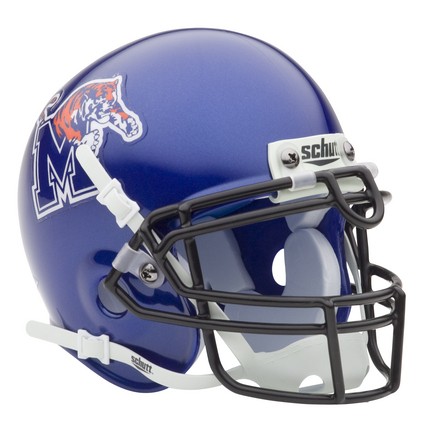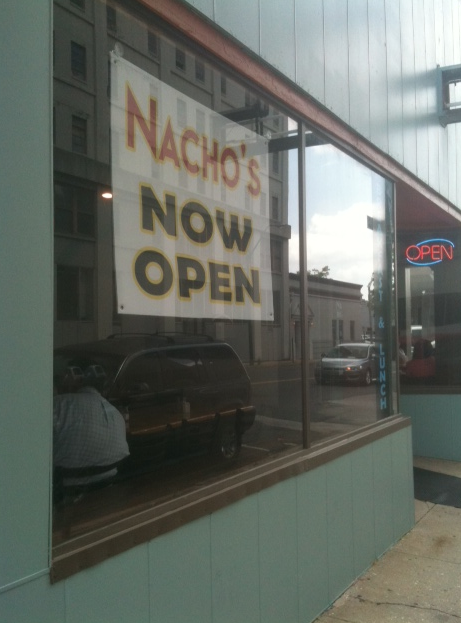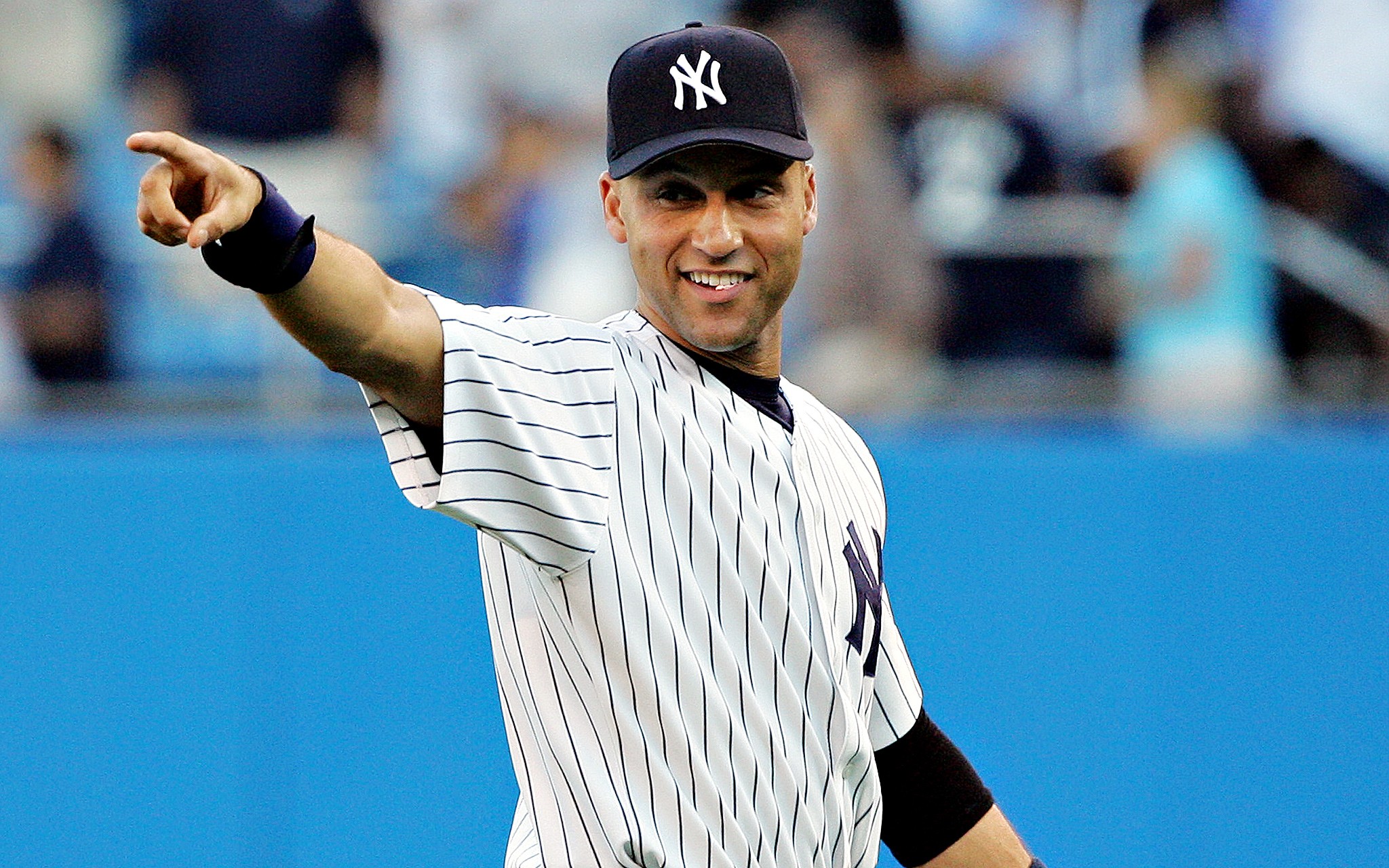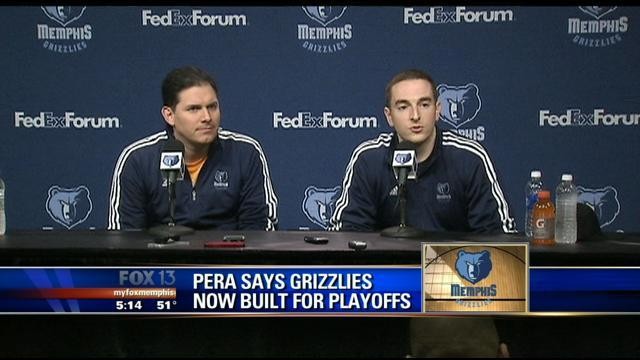
- A crazy person and a pathological liar, depending on who you read.
1. Why were Jason Levien and Stu Lash fired?
If you know the real answer to this, you should probably get in touch with me. A week later, we still don’t really know anything about what specifically Levien was fired for. After all, Pera was perfectly happy to have Levien and Lash attend the draft combine in Chicago, and (because he apparently desires to be an NBA owner without ever having to address the media) Pera hasn’t specifically addressed any of it.
That’s really my biggest complaint about the whole thing: it’s entirely possible that the firing of Levien was completely justified. (Lash appears to have been collateral damage, fired purely for being known as Levien’s right-hand man.)
The panic—and the damage to the Grizzlies’ reputation as a well-run organization—has all come about because Pera hasn’t said one word about why any of this happened. What direction was the team heading in that so dissatisfied Pera? What do these personnel changes enable Pera to do that he couldn’t do before? It’s 100% possible to answer these questions without gossiping about former employees. A change at the top of the basketball operation means, by definition, some sort of change in the on-court product, whether big or small. That’s what needs to be addressed here. So… we don’t know. Apparently we might never find out.
2. Isn’t Jason Levien a liar and a scoundrel, though?
Well, he is if you believe everything in this Sean Deveny piece. And, likewise, Robert Pera is a crazed lunatic if you believe everything in this Chris Mannix piece.
The truth, as ever, is probably somewhere in the middle—although I must point out that Jason Levien’s being a shady dealer and the possibility that Pera is out of his depth and a little crazy are not mutually exclusive. It’s clear in the aftermath of Levien’s dismissal that he was probably either (1) trying to do too much or (2) not paying the attention to Pera that Pera felt he deserved or (3) both, especially after reading Chris Herrington’s excellent TrueHoop piece from yesterday.
[jump]
And, look, anybody who listened to a Levien interview knew he was an expert at using a whole lot of words and saying literally nothing informational. The guy comes from a background of being a lawyer and an agent, used to telling people the parts of the truth that he needs to accomplish what he needs to accomplish. It’s standard practice for those guys. There’s no doubt in my mind that Levien was probably “handling” Pera the say he probably “handled” clients and teams with which he was negotiating in the past. But… that doesn’t mean he wasn’t good at running a basketball team, does it?
One of the most interesting aspects of this story has been watching the national media fallout and being able to almost immediately pinpoint which side leaked what to which media members. Who do you think was the primary source for that Mannix piece? (Hint: not Robert Pera.) And who do you think made the leak that was behind the original tweet that broke the story:
Notice how that (1) doesn’t line up with what we mostly agree actually happened and (2) came hours before the team’s prepared press release?
Let this be a lesson to you: NBA reporting, especially on these kinds of fast-breaking, underground stories, is almost entirely constructed out of leaks from involved parties, and usually those parties have an axe to grind, or, at the very least, an agenda of some sort.
All that is to say: he’s definitely a guy who is interested in being a powerful figure, often described as wanting to own a team but not having the money to do so, hence his construction of an ownership power structure in Memphis that—temporarily, anyway—placed him at the center of almost everything that went on. And you don’t build yourself that kind of power without doing something you wouldn’t necessarily want published in Sporting News.
3. Is it a good thing that Chris Wallace is staying?
Well, it’s a thing, whether good or bad. In his impromptu Twitter Q&A, Robert Pera said “Whether we decide on Chris or not for GM, I want him in the organization in some capacity.”
Whether or not this is a good thing is honestly sort of hard to figure out. Throughout Wallace’s previous tenure with the organization—I know he wasn’t fired, but being told to go pound sand for a year and a half isn’t exactly “working as a GM”—it was always hard to tell which decisions were his and which were Michael Heisley’s. Thabeet? Heisley. Rudy Gay’s insane contract? Heisley, probably. The player options on Rudy and Zach’s big contracts? Probably Wallce. Drafting Grievis Vasquez? Wallace. Selling the 25th pick in that draft for $3 million? Heisley.
My point is this: Wallace is used to having an owner interfering influencing basketball decisions. This will help his relationship with Robert Pera whether or not it helps the Grizzlies win basketball games.
That’s the flipside of this: Wallace is the guy who brought in Zach Randolph, and the guy who recruited Tony Allen away from the Celtics, the guy who was around when Mike Conley was drafted, and, yes, the guy behind the Pau Gasol trade (even though I refuse to believe that anyone knew Marc would be this good at the NBA level). He built this core, for the most part. He might not have made all the smart low-cost contract signings that Levien/Lash/Hollinger made (Calathes, Leuer, the Koufos trade, et al), but he’s the guy who got the big names here. They’re comfortable with him, which will help in the negotiations over Zach Randolph’s contract and Marc Gasol’s approaching free agency.
My problem with Wallace is this: when he was sent into exile, the Grizzlies were in pretty dire financial straits, cap-wise. They were forced to deal Rudy Gay before they had to pay him $19 million. Zach Randolph has a $16.5 million player option that would put them right back in the same boat, even though they dealt Rudy Gay to dodge that bullet. Chris Wallace was the guy who was around for these huge deals—he apparently feels that players have to be overpaid to stay in Memphis, rather than recruiting them on the merits of playing for a winning team. I’m not sure that, financially, he’s the best guy to have. I’m not convinced he signs guys to reasonable contracts.
Overpaying Zach Randolph and keeping some of these older guys around (Tayshaun Prince, and—look, let’s be honest—Tony Allen in a year or two) may set the team up for some bad years in the near future. Will Chris Wallace be a status quo guy, or a guy willing to make wildly unpopular moves to make his team better (including trading players with whom his boss and owner has a BFF relationship; more on that later)?
¯\_(ツ)_/¯
4. Is John Hollinger staying?
Officially, yes. I haven’t spoken to him, but other people have, and the official word is still that he’s doing his thing, working on draft preparations. But… is Hollinger, who was brought in by Levien, going to want to stick around now that the Grizzlies have no GM and the entire org chart has been set on fire? Will he want to report to Chris Wallace if that’s how this plays out? How many other teams are contacting him with Godfather offers (as in, the kind you can’t refuse) to bail on the Grizzlies’ current circus and come do something else?
We don’t know. Right now, the official word is that Hollinger is staying, and I hope that’s the case, because he’s a good guy with a great mind for basketball, and his contributions to statistical analysis of basketball can’t be disputed. (Though they probably will be by the ever-present Lionel Hollins Truther Movement.)
5. Does this mean Zach Randolph is coming back?
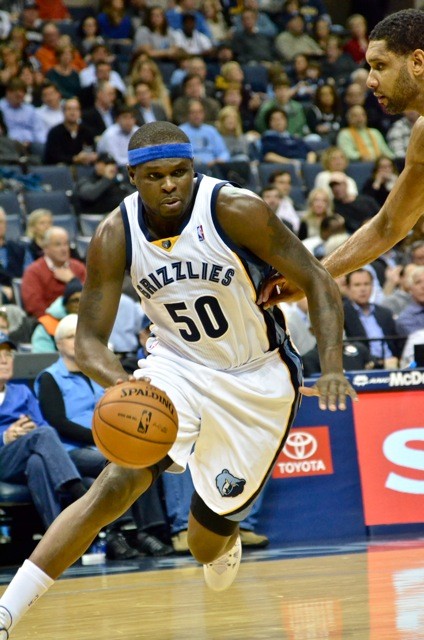
- Larry Kuzniewski
- Chris Wallace’s return to power makes it more likely Zach Randolph will return.
I will say this: it makes it more likely, for two reasons: Zach (and Zach’s representatives) have a comfortable relationship with Chris Wallace that they may not necessarily have had with Levien & Co.
The other reason? I think Wallace is going to be (1) more willing to overpay Randolph to stay and (2) less comfortable with letting Randolph go, even if it’s the right basketball move to make. If some other team makes a run at Randolph and pushes his asking price into the $13-14 million range (per year), I think Chris Wallace is going to be much more willing to just get the deal done rather than letting him walk, no matter what the consequences from a basketball or salary cap standpoint…
…which is why I’m not sure keeping Chris Wallace around calling the shots is the right thing.
6. What was said in Pera’s interviews with the players?
We’ll probably never know anything resembling an answer to this. Some of them may have said they disapproved of Joerger. Some of them may have expressed some sort of doubts about Levien and Lash, although that seems unlikely. Maybe Pera was just asking them all if he could work out with them over the summer? One thing is certain, though: if Pera’s willingness to let Joerger interview for the Minnesota job was based on feedback he got from a player with whom he wants to be buddies—put another way, if Pera is willing to let Tony Allen, for instance, make decisions about who’s going to coach the team—that’s not going to be good for the future stability or success of this franchise. Period. If Pera lets his desire to hang out with NBA players get in the way of his desire to build a championship team and make decisions with which the players with whom he’s friends aren’t necessarily thrilled, that’s not a good look going forward.
7. Aren’t media members just mad because Pera talked on Twitter instead of in a press conference?
Some of them might be, but be wary of people telling you that this whole incident is only a big deal because media members are pitching a fit because they’ve been denied access. (Especially when the people telling you that are people who also cover Griz games as credentialed media.) There’s a reason basketball writers exist: to keep fans (and other interested folks) in the know about what’s going on with the team. To shed light on what’s happening. The frustration with this whole thing isn’t that Pera took to Twitter to answer fan questions—it’s that he did that instead of talking to media.
In a press conference, Robert Pera doesn’t get to choose which questions he acknowledges and responds to. Reporters can ask him questions which he’d prefer not to be asked—questions about his motivations, why he did what he did. He doesn’t have to answer them, but he can’t simply ignore them as though they weren’t asked. That’s the frustration among media members here. Not some hissy fit about access (for the most part; there are certainly media members with egos—you all know that).
Press conferences and media availability exist for a reason. It’s not just about getting to hobnob with NBA players and executives. Ultimately, it’s about information, and precious little has been put forth throughout this situation.
8. Who is this Mincberg dude everyone was talking about last week?
According to some stories, he’s a guy who everyone hated so much that Levien had to ship him out of town, who then went Machiavelli and poisoned the relationship between Pera and Levien by telling Pera he was the boss and needed to be calling the shots.
According to some stories, he’s that, and he was the muscle behind Levien—the guy who fired the Barones, the guy who brought down the axe and did the dirty work of cleaning house after the Pera/Levien group took over the franchise.
According to others, he’s just a dude who was Levien’s student in a sports law class at UC Berkeley who then talked his way into a job and has been working for him ever since in some capacity.
Honestly, there’s way too much smoke around the first two options for there not to be a little fire. But Mincberg remains an International Man of Mystery, and we’ve heard and seen nothing about him since the early days of this conflagration (other than the asinine Eric Musselman rumors). This may end up being another one of the “we’ll never know” aspects of this ordeal.
9. Is Pera a bad owner because of this?
No. He’s also not a good owner because of this. I’ll refer you back to Herrington’s TrueHoop piece, because he and I share a similar evaluation of Pera—his naïveté, his confidence, his quixotic desire to play against his own players, his refusal to go through “normal” media channels. The fact of the matter is that we have no idea whether he’s a good owner or not. He hasn’t been here long, and hasn’t been very hands-on in the time he’s been controlling owner. He’s almost never in Memphis. We just don’t know.
My hope is that his enthusiasm and engagement can be tempered with a little NBA realpolitik and turned into a great, stable franchise that wins a lot of championships. The worst-case scenario is a small-market version of the Knicks, which will be fascinating, but if that’s the future, they’ll quickly run out of money and move to Seattle back to Vancouver or something when the lease is up. Small market NBA teams cannot thrive without vision and stability. Right now we only know Pera has vision (though we’re not quite sure what it is). The latter can only be built and proven over time.
